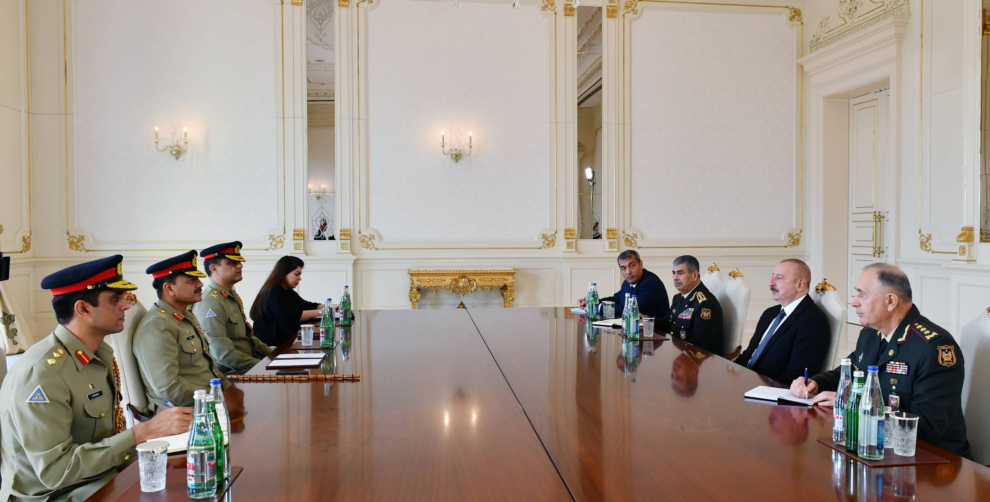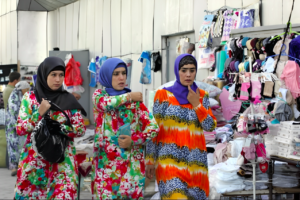President Ilham Aliyev expressed Azerbaijan’s satisfaction with Pakistan’s political support during the Second Karabakh War with Armenia.
During a meeting with Pakistan’s Chief of Army Staff, Asim Munir, in Baku on Wednesday, President Aliyev praised Islamabad for its brotherly attitude, specifically for refusing to establish diplomatic ties with Armenia due to its occupation of Azerbaijani lands from 1991 to 2020.
The Azerbaijani leader commended this as a strong demonstration of support by the Pakistani authorities and people for the sovereignty and territorial integrity of Azerbaijan. In return, Baku reiterated its support for Islamabad’s stance on the issue of Jammu and Kashmir.
Armenia and Azerbaijan had been in armed conflict over the latter’s Karabakh (Garabagh) region for a long time. Following the dissolution of the Soviet Union in 1991, Armenia initiated a full-scale military aggression against Azerbaijan, leading to the longest and deadliest war in the South Caucasus region. The bloody war lasted until a ceasefire was reached in 1994 and saw Armenia occupying 20 percent of Azerbaijan’s internationally recognized territories. The conflict resulted in the death of over 30,000 Azerbaijanis, nearly 4,000 people went missing, and one million were expelled from their lands in a brutal ethnic cleansing campaign conducted by Armenia.
The United Nations Security Council adopted four resolutions in 1993, demanding the immediate withdrawal of the occupying forces from Azerbaijani lands and the return of internally displaced Azerbaijanis to their ancestral lands, however, Armenia failed to comply with these four legally binding documents.
On September 27, 2020, the Armenia-Azerbaijan conflict took a violent turn when Armenia’s forces deployed in the occupied Azerbaijani lands shelled military positions and civilian settlements of Azerbaijan. During the 44-day counter-attack operations, Azerbaijani forces liberated over 300 settlements, including the cities of Jabrayil, Fuzuli, Zangilan, Gubadli, and Shusha, from nearly 30 years of illegal Armenian occupation. The war concluded with the signing of a statement on November 10, 2020, under which Armenia also returned the occupied Aghdam, Kalbajar, and Lachin districts to Azerbaijan.
Throughout the 44-day Armenia-Azerbaijan war, Pakistani authorities, including former Chairman of the Joint Chiefs of Staff Committee General Nadeem Raza and the Foreign Ministry of Islamabad, voiced full support for Azerbaijan’s position on the conflict, in line with the adopted UN resolutions.
This spirit of support was also evident during the anti-terror operation by the Azerbaijan Armed Forces to disarm Armenian army formations and separatist troops in the Karabakh region in September 2023. At that time, Foreign Ministry spokeswoman Mumtaz Zehra Baloch stated that Islamabad considered the Karabakh region the sovereign territory of Azerbaijan, and Baku’s efforts to demilitarize the region were within its legitimate rights.
Azerbaijan also continued to support Pakistan’s stance on the Kashmir conflict, advocating for the relevant UN Security Council resolutions to be the primary tool in achieving a lasting solution to one of the world’s oldest protracted issues.
Since 1947, Pakistan and India have been engaged in a dispute over Kashmir, a Himalayan region located northeast of Pakistan and north of India. Although a ceasefire halted intensive fighting in 2003, the situation remains fragile, with regular fire exchanges along the so-called Line of Control, a 460-mile-long (740-kilometer) military control line. Both Delhi and Islamabad claim the entire Kashmir region, but neither country exercises full control over it.
Partial control of territories by the two countries is recognized internationally as “Indian-administered Kashmir” and “Pakistan-administered Kashmir”. Pakistani authorities have consistently stated that the Kashmiri people should have the choice to join Pakistan or remain independent, rejecting any idea of the region’s incorporation by India. Islamabad believes that dialogue and relevant UN resolutions should be the foundation for resolving the conflict.
In January 2021, foreign ministers of Azerbaijan, Türkiye, and Pakistan met in Islamabad to issue a joint declaration that addressed various issues. In the document, the sides also voiced concern over “human rights violations in and efforts to change the demographic structure of Jammu and Kashmir” and reiterated their stance for a peaceful settlement of the dispute “in accordance with the relevant UN Security Council resolutions.”
In September 2021, the Armed Forces of Azerbaijan, Türkiye, and Pakistan jointly conducted their first-ever joint drills, known as “Three Brothers – 2021,” in Baku.
Source : Caspiannews











